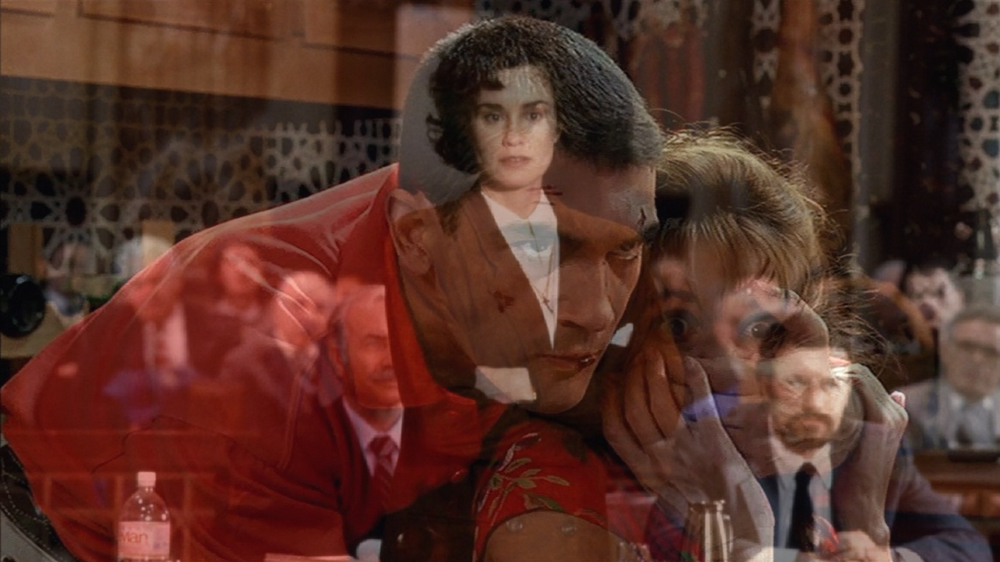It’s been said before, but in the world of the Internet where any view you express is locked in forever, immutable in the eyes of the infinite memory machine, it’s important to reiterate as often as possible: the opinion of a critic is subject to change, and oftentimes we get it wrong. Well, not wrong exactly – we get it right for when we watched it, but wrong for the future. It becomes wrong when our opinion changes and makes it so. In some ways, this is one of the few benefits to my irredeemable and constant procrastination, aided and abetted by my all-consuming sloth: by the time I sit down and write about a movie, my views since watching it have often changed. Some just in the fine details, and some (like Hellraiser: Inferno) in my entire evaluation of the film, both in its aims and its successes. What I mean to say is: this is going to be a very different essay than the one I would’ve written immediately following my viewing of Pedro Almodóvar’s ¡Átame!, known in English and hereafter in this article as Tie Me Up! Tie Me Down! (mostly because I’m worried every single time I’m going to put the wrong accent on the A and look like a gosh dang fool).
Yes, for my two films in this tournament of champions, I was asked to view the mostly canonical classic Tie Me Up! Tie Me Down! alongside a film I’d never heard of despite it being penned by a writer I previously believed I adored (more on that later), Music Box. These are quite different films, one being a pitch-black romantic (?) comedy (?) about a man who ties up the woman of his dreams until she falls in love right back, and the other is a courtroom drama centered around war crimes committed during World War II. But what they both share is uncomfortable material – abuse and mental illness in Tie Me Up! Tie Me Down!, the rape, torture, and murder of Jews and Romani during WWII in Music Box – and an interest in exploring themes related to that tough stuff. Unfortunately, the tackling of such material is one that needs to be done with skill, taste, and a strong vision, and only one of these two movies was made in such a way where I actually believe there was a director involved and not, instead, a gaggle of sentient cameras each quizzically trying to divine what this strange thing called “acting” is that the humans do.
Tie Me Up! Tie Me Down! is, in its barest bones, the story of a man just released from a mental hospital who kidnaps an actress he adores and ties her up in her apartment, waiting out her resistance until his love is returned in kind. There’s lots of ways this material could go horribly, horribly wrong, reinforcing uncritically narratives of both the dangers of the mentally ill and the non-agency of women in relationships, positing abuse as a quirky kind of courtship. Initially, despite the film as a whole being entertaining, this is what I thought it was doing, and it made me feel more than a bit icky; this certainly is the reading that many groups who initially protested it took, and it’s one that is easy to support in the text. But some part of me felt like I was missing something, and I haven’t been able to stop thinking of the film since.
As will happen, I found the disparate pieces fitting together in the broader picture as my mind moved away from details and into the whole scope of things, and suddenly the scenes I didn’t really get became the keys to unlocking a different film, one that was there the whole time but hiding from me in humor and satire, in subtle looks and filmic techniques; this was a narrative about abuse, yes, but it knew it. The film got it. It was me who was lulled into a false reading by Antonio Banderas’ roguish charm (and really, can you blame me?). Almodóvar wasn’t content with telling the viewer that this man was manipulative, abusive, and cruel; he wanted you to understand why people, rational, normal people, fall into these types of relationships.
Without getting into an entirely different essay, suffice it to say that Banderas’ winning personality is a cover for his lack of empathy, for his desire to control. The film follows the beats to make us want him to win her over, it makes us feel sympathy for him, because it wants us to feel like love has won. But that final scene – why is our heroine crying? She’s crying because she knows what just happened. It’s not out of happiness, it’s out of grief, for falling back into her spiral of pain and suffering, of allowing herself to be controlled again. And everyone around her is singing as she heads back home to abuse. I was tricked just like the sister; I thought I saw a love story. What I really saw was manipulation and violence turned over into a facade of compassion. It was so easy to fall into the trap, not forcing a reading but easing it over a bumpy story, ignoring the parts that made my view inconvenient. It’s funny, but it’s also deeply sad, a film that sets up the tee for you, and when you finally hit the home run and the whole crowd is cheering, you beaming from ear to ear, Pedro comes over and lets you know you were playing for the evil land developer and the bikini car wash baseball team and jeep tour company is going to lose their community center.
As you might imagine from my previous comments, Music Box does nothing so assured with its direction. Costa-Gavras is, I’ve been told, a great filmmaker, and I’ll admit ignorance and say I haven’t seen anything else he’s done. But if this is true, then he wasn’t just asleep at the wheel- he was altogether absent, off somewhere having a nice drink and a laugh at the people writing his paychecks. It’s not that the film is directed poorly, it’s that it’s not directed at all in any noticeable way. Everything just sorta happens, it’s all flat, and though Jessica Lange does a great job, she seems to be flailing out at points, trying to hit the walls that no one bothered to put up. She’s a lawyer defending her probably guilty father from accusations of being a war criminal, but it all never rises above the level of decent Law and Order episode. Do you know that feeling when you find out movies like Jack and Jill or The Maze Runner actually have directors, that they didn’t just emerge somehow from a primordial Hollywood ooze fully formed with no human intervention? Imagine that for two hours, and it’s about Hungarian war crimes during WWII.
Oh but folks, Costa-Gavras isn’t the only auteur cashing paychecks here, no Ma’am! Joe Eszterhas wrote the screenplay! Yes, that Joe Eszterhaus. Of Basic Instinct and Showgirls fame. And yes, I am one of those ardent Showgirls supporters your critical establishment warned you about, and from that and Basic Instinct alone I considered myself a great fan of the man. Music Box, however, implies that I was not only wrong, but a fool. There’s a second common link between those films, the wonderful, masterful Paul Verhoeven, and I realized that Verhoeven makes Joe Eszterhas look like a good writer the same way his adaptation of Starship Troopers makes Robert Heinlein look like a good writer and not a totally bonkers self-infatuated crypto-fascist: he doesn’t give a hot fuck what the script writer’s intent was. He is, above all, a sure hand, morphing everything that comes through him into a reflection of himself. So when Costa-Gavras is taking a nap and Eszterhas’ script is just flying along, no reigns? It’s a real disaster, so didactic and sophomoric that I couldn’t even be offended that it turned some of the 20th century’s greatest and most disturbing crimes into a by-the-numbers courtroom potboiler. It’d be like getting mad at your dog for accidentally scrawling the complete text of The Turner Diaries in the dirt outside: why bother? He doesn’t know what he’s doing.
This makes the film sound slightly worse than it really is though. It’s pulpy fun, but it is more than a tad disturbing that “holocaust drama” and “pulpy fun” could fit into the same film review (outside of Inglorious Basterds). The choice here is clear though. Even if I hadn’t reevaluated Tie Me Up! Tie Me Down!, it’d still get the nod based purely on interest, historical status, and those little things like shot composition, writing, editing, and acting. As is, I almost feel bad that my round one was such a one-sided fight. Music Box never stood a chance; Almodóvar knocked it out on the first punch and spent the rest of the fight painting the room striking bright colors and showing Antonio Banderas’ denim-covered (and not so covered) ass to everyone in attendance, giving us ample time to appreciate it. Kudos to you Pedro – it wasn’t a hard fight, but you won it fair and square.
The winner: Tie Me Up! Tie Me Down!
—
Both movie are in print and available for purchase on Amazon, while Music Box is available through Netflix’s DVD-by-mail service. Most imprtantly, both of these movie ahould be available at your local independent video store.
Tie Me Up! Tie Me Down!; directed by Pedro Almodóvar; written by Pedro Almodóvar; starring Victoria Abril and Antonio Banderas; 101 minutes.
Music Box; directed by Costa-Gavras; written by Joe Eszterhas; starring Jessica Lange, Armin Mueller-Stahl, and Frederic Forrest; 124 minutes.
All of the match-ups in the 1989 tournament of Films are collected here.




 Derek
Derek
 Isabelle
Isabelle